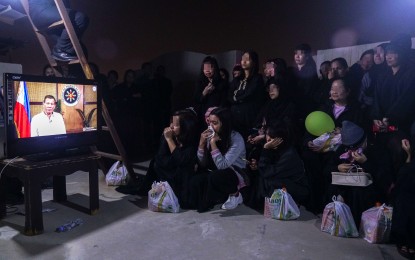
(File photo)
MANILA – The Department of Foreign Affairs (DFA) described as another milestone in the anti-Kafala campaign abroad the move of Saudi Arabia to remove key restrictions on its foreign workers, giving them the right to change jobs and leave the host country without employers' permission.
Saudi Arabia is set to implement the “Labor Relation Initiative” starting in March 2021, according to DFA.
This will grant foreign workers, including overseas Filipino workers, the freedom to change jobs by transferring their sponsorship from one employer to another, leave and reenter the country and secure final exit visas without the consent of their employer.
As of June, there are about 865,121 Filipino workers in Saudi Arabia.
Riyadh's move follows recent positive developments in the Middle East initiated by Bahrain and Qatar which have already started abolishing the restrictive Kafala.
Qatar is the first country in the Arab Gulf region to allow all migrant workers to change jobs before the end of their contracts without first obtaining their employer’s consent.
Bahrain, on the other hand, took a positive step further with its Flexi Visa system allowing undocumented/irregular workers, including undocumented Filipino migrant workers, to acquire regular immigration status without an employer sponsor.
Since the tragic death of Joanna Demafelis, the Filipina domestic worker who was murdered by her employers and hidden in a freezer in Kuwait, the Philippines has been at the forefront of an aggressive anti-Kafala diplomatic campaign in the Middle East.
In its statement, the DFA noted that President Rodrigo Duterte is the first and perhaps the only head of state to openly criticize the Kafala system.
“Not only did the Philippines speak against Kafala in the United Nations and in every possible international forum; we walked the talk by partnering with the prominent Kingdom of Bahrain in their labor reforms. We supported Bahrain’s Flexi Visa system that allows migrant workers to become freelancers and to be free of sponsors,” DFA Undersecretary for Migrant Workers' Affairs Sarah Lou Arriola said.
Arriola hoped these major changes will soon cascade to more countries in the Middle East, where millions of Filipino workers are employed.
Kafala originated from the Arabic word which means “sponsorship”. The system is a mechanism in the Gulf countries used to monitor migrant workers, usually unskilled workers such as household service workers, construction workers through a sponsor.
Sponsors are usually the employer, who is responsible for the immigration status and visa of the migrant worker.
"Under the Kafala, a worker cannot leave the employer despite abuse/maltreatment or transfer to another employer for better working conditions, without the consent of the present employer-sponsor. Critics thus note that a worker is treated like a property of the employer under the Kafala system," the DFA explained.
The Philippines is one of the leading countries to push for the Global Compact for Safe, Orderly and Regular Migration (GCM), a primary UN process to protect migrant workers against all forms of exploitation and abuse, and guarantee decent work.
This is also consistent with President Duterte's position that "the Filipino is no slave to anyone anywhere and everywhere.” (PNA)
